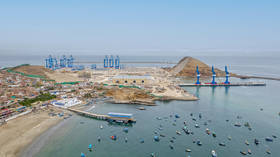Eurozone leaders meet ‘to conclude talks on Greece’
A summit of all EU leaders scheduled for Sunday has been cancelled with eurozone leaders only meeting to “conclude talks on Greece.” On Saturday, a meeting of Eurogroup finance ministers was adjourned without reaching any conclusion.
Early on Sunday, Donald Tusk, the president of the European Council, tweeted that the eurozone leaders’ meeting will start at 14:00 GMT.
I have cancelled #EUCO today. #EuroSummit to start at 16h and last until we conclude talks on #Greece
— Donald Tusk (@eucopresident) July 12, 2015
“We had an in-depth discussion of Greek proposals, the issue of credibility and trust was discussed, and also of course financial issues involved. But we have not concluded our discussions, so we will continue at 11:00am,” the president of the Eurogroup Jeroen Dijsselbloem told journalists late Saturday.
READ MORE: Greek banks to go bankrupt Monday if no debt deal – FT
“It is still very difficult, but work is still in progress,” the Dutch finance minister added, refusing to share any details of the negotiations.
Meanwhile the Maltese PM Joseph Muscat, who is due to attend a eurozone summit in Brussels, predicted that Sunday “will be a long day.”
The Eurogroup has been convening for more than seven hours, but the negotiations have produced no results, as the eurozone seems to lack “trust” in Athens ability and willingness to implement reforms needed to keep the economy afloat.
Creditors want “more specific and binding commitments” from the Greek government, a European official at the talks told AP, adding that Athens’ proposals are “too little, too late.”
“We are still a long way out, both on the issue of content as on the tougher issue of trust,” Dijsselbloem said just before the meeting. “On paper it is not good enough yet – and even if it is good on paper, then we still have the question: will it really happen?”
Several EU officials called upon Germany, which holds the majority of Greece’s debt, not to allow it to exit the eurozone.
"Now common sense must prevail and an agreement must be reached. Italy does not want Greece to exit the euro and to Germany I say: enough is enough," Italian Prime Minister Matteo Renzi was quoted as saying by Rome-based daily Il Messaggero.
Luxembourg's Foreign Minister Jean Asselborn told Germany's Sueddeutsche Zeitung newspaper that if Berlin “pushes for a Grexit, it will provoke a profound conflict with France. That would be a catastrophe for Europe.”
"It would be fatal for Germany's reputation in the EU and the world if Berlin does not seize the chance that there now is with the Greek reform offers,” he said.
A senior member of the Greek ruling Syriza party, Dimitrios Papadimoulis, said that Berlin is humiliating Greece with new demands for a bailout deal and trying to overthrow its government.
"What is at play here is an attempt to humiliate Greece and Greeks, or to overthrow the Tsipras government," he told Greek Mega TV.
In a paper reviewing an offer of reforms from the Greek government, the German Finance Ministry offered two options – either tougher measures or a five-year “time-out” from the eurozone, Reuters reported on Sunday.
In a Friday vote, lawmakers in the Greek parliament backed the latest proposals for economic reforms and further austerity measures which Athens submitted to the Eurogroup earlier this week.
READ MORE: ‘National responsibility’: Greek MPs bless bailout deal seen by creditors as ‘positive’
The new reform proposals include moving more items to the standard 23 percent VAT rate, as well as the privatization of regional airports and seaports. Greeks also agreed to eventually abolish solidarity installments for poor pensioners by December 2019, a year earlier than planned, and raise the retirement age to 67 by 2022. The early retirement also will be abolished.
In return for caving in to most of the creditors demands, which the Greek nation voted against during last weeks’ referendum, Tsipras is trying to bargain a better deal which includes a €53.5 billion ($59.7 billion) bailout package over the next 3 years.
Unless the deal is agreed on Sunday, the country’s banking system may end up bankrupt on Monday. Cash withdrawals from Greek banks reach €100 million ($111 million) a day, with ATMs transactions limited to €60 ($67).











